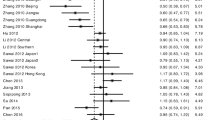Abstract
To investigate the association between X-ray repair cross-complementing group 1 (XRCC1) Arg399Gln polymorphism and hepatitis virus-related hepatocellular carcinoma risk, we performed a systematic meta-analysis of eligible case–control studies. Eligible studies were identified from the PubMed, Embase, and Chinese National Knowledge Infrastructure databases up to March 2013. The odds ratios (ORs) and corresponding 95 % confidence interval (95 % CI) of XRCC1 Arg399Gln polymorphism in hepatitis virus-related hepatocellular carcinoma cases compared with those in controls were calculated. The meta-analysis was performed using fixed-effect or random-effect methods according to the absence or presence of heterogeneity. This meta-analysis included 1,558 cases with hepatitis virus-related hepatocellular carcinoma and 1,338 controls. Meta-analysis of available data showed that there was no association between XRCC1 Arg399Gln polymorphism and risk of hepatitis virus-related hepatocellular carcinoma under all contrast models (Gln vs. Arg: fixed-effect OR = 0.92, 95 % CI 0.82–1.04, P = 0.18; GlnGln vs. ArgArg: random-effect OR = 0.79, 95 % CI 0.50–1.25, P = 0.32; GlnGln/ArgGln vs. ArgArg: fixed-effect OR = 0.92, 95 % CI 0.79–1.07, P = 0.28; and GlnGln vs. ArgArg/ArgGln: random-effect OR = 0.83, 95 % CI 0.52–1.34, P = 0.45). Sensitivity analysis further showed that there was no association between XRCC1 Arg399Gln polymorphism and risk of hepatitis B-related hepatocellular carcinoma under all contrast models (Gln vs. Arg: fixed-effect OR = 0.93, 95 % CI 0.82–1.05, P = 0.25; GlnGln vs. ArgArg: fixed-effect OR = 0.86, 95 % CI 0.64–1.16, P = 0.32; GlnGln/ArgGln vs. ArgArg: fixed-effect OR = 0.93, 95 % CI 0.80–1.10, P = 0.41; and GlnGln vs. ArgArg/ArgGln: fixed-effect OR = 0.85, 95 % CI 0.63–1.13, P = 0.26). Our meta-analysis of the available data did not find an obvious effect of XRCC1 Arg399Gln polymorphism on hepatitis-related hepatocellular carcinoma. More well-designed studies with large sample are needed to further verify the effect.


Similar content being viewed by others
References
El-Serag HB. Hepatocellular carcinoma. N Engl J Med. 2011;365:1118–27.
Siegel R, Naishadham D, Jemal A. Cancer statistics. CA Cancer J Clin. 2012;62:10–29.
Ganem D, Prince AM. Hepatitis B virus infection—natural history and clinical consequences. N Engl J Med. 2004;350:1118–29.
Webster DP, Klenerman P, Collier J, Jeffery KJ. Development of novel treatments for hepatitis C. Lancet Infect Dis. 2009;9:108–17.
Farazi PA, DePinho RA. Hepatocellular carcinoma pathogenesis: from genes to environment. Nat Rev Cancer. 2006;6:674–87.
Tiniakos DG, Vos MB, Brunt EM. Nonalcoholic fatty liver disease: pathology and pathogenesis. Annu Rev Pathol. 2010;5:145–71.
Ginsberg G, Angle K, Guyton K, Sonawane B. Polymorphism in the DNA repair enzyme XRCC1: utility of current database and implications for human health risk assessment. Mutat Res. 2011;727:1–15.
Xue H, Ni P, Lin B, Xu H, Huang G. X-ray repair cross-complementing group 1 (XRCC1) genetic polymorphisms and gastric cancer risk: a huge review and meta-analysis. Am J Epidemiol. 2011;173:363–75.
Qian B, Zhang H, Zhang L, Zhou X, Yu H, Chen K. Association of genetic polymorphisms in DNA repair pathway genes with non-small cell lung cancer risk. Lung Cancer. 2011;73:138–46.
Chen CC, Yang SY, Liu CJ, Lin CL, Liaw YF, Lin SM, et al. Association of cytokine and DNA repair gene polymorphisms with hepatitis B-related hepatocellular carcinoma. Int J Epidemiol. 2005;34:1310–8.
Kiran M, Saxena R, Chawla YK, Kaur J. Polymorphism of DNA repair gene XRCC1 and hepatitis-related hepatocellular carcinoma risk in Indian population. Mol Cell Biochem. 2009;327:7–13.
Jung SW, Park NH, Shin JW, Park BR, Kim CJ, Lee JE, et al. Polymorphisms of DNA repair genes in Korean hepatocellular carcinoma patients with chronic hepatitis B: possible implications on survival. J Hepatol. 2012;57:621–7.
Bose S, Tripathi DM, Sukriti, Sakhuja P, Kazim SN, Sarin SK. Genetic polymorphisms of CYP2E1 and DNA repair genes HOGG1 and XRCC1: association with hepatitis B related advanced liver disease and cancer. Gene. 2013;519:231–7.
Gulnaz A, Sayyed AH, Amin F, Khan A, Aslam MA, Shaikh RS, et al. Association of XRCC1, XRCC3, and XPD genetic polymorphism with an increased risk of hepatocellular carcinoma because of the hepatitis B and C virus. Eur J Gastroenterol Hepatol. 2013;25:166–79.
Cochran WG. The combination of estimates from different experiments. Biometrics. 1954;10:101–29.
DerSimonian R, Laird N. Meta-analysis in clinical trials. Control Clin Trials. 1986;7:177–88.
Mantel N, Haenszel W. Statistical aspects of the analysis of data from retrospective studies of disease. J Natl Cancer Inst. 1959;22:719–48.
Begg CB, Mazumdar M. Operating characteristics of a rank correlation test for publication bias. Biometrics. 1994;50:1088–101.
Egger M, Davey Smith G, Schneider M, Minder C. Bias in meta-analysis detected by a simple, graphical test. BMJ. 1997;315:629–34.
Han Y, Yang J, Zheng S, Wu Y. Study on the association of human XRCC1-399 single nucleotide polymorphism and primary hepatocytic carcinoma [article in Chinese]. Chin Hepatol. 2004;9:235–7.
Ren Y, Wang D, Li Z. Study on the relationship between gene XRCC1 codon 399 single nucleotide polymorphisms and primary hepatic carcinoma in Han nationality [article in Chinese]. Chin J Clin Hepatol. 2008;24:361–4.
Liu F, Li B, Wei Y, Yan L, Wen T, Zhao J, et al. XRCC1 genetic polymorphism Arg399Gln and hepatocellular carcinoma risk: a meta-analysis. Liver Int. 2011;31:802–9.
Dong LM, Potter JD, White E, Ulrich CM, Cardon LR, Peters U. Genetic susceptibility to cancer: the role of polymorphisms in candidate genes. JAMA. 2008;299:2423–36.
Brennan P, Hainaut P, Boffetta P. Genetics of lung-cancer susceptibility. Lancet Oncol. 2011;12:399–408.
Author information
Authors and Affiliations
Corresponding author
Additional information
The Publisher and Editor retract this article in accordance with the recommendations of the Committee on Publication Ethics (COPE). After a thorough investigation we have strong reason to believe that the peer review process was compromised.
An erratum to this article can be found online at http://dx.doi.org/10.1007/s13277-017-5487-6.
About this article
Cite this article
Wu, D., Jiang, H., Gu, Q. et al. RETRACTED ARTICLE: Association between XRCC1 Arg399Gln polymorphism and hepatitis virus-related hepatocellular carcinoma risk in Asian population. Tumor Biol. 34, 3265–3269 (2013). https://doi.org/10.1007/s13277-013-0899-4
Received:
Accepted:
Published:
Issue Date:
DOI: https://doi.org/10.1007/s13277-013-0899-4




